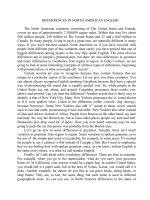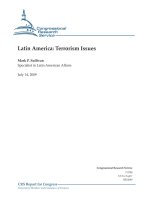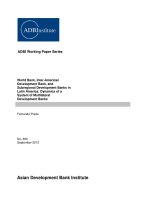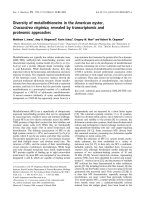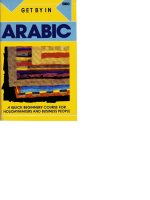get by in latin american spanish
Bạn đang xem bản rút gọn của tài liệu. Xem và tải ngay bản đầy đủ của tài liệu tại đây (3.26 MB, 16 trang )
Essential travel language
SPANISH
SPANISH
LATIN AMERICAN
ALL THE SPANISH YOU NEED TO
GET BY WITH CONFIDENCE
GET BY
in
3
BBC Active, an imprint of Educational Publishers LLP, part of the Pearson Education Group
Edinburgh Gate, Harlow, Essex CM20 2JE, England
© Educational Publishers LLP 2008
BBC logo © BBC 1996. BBC and BBC ACTIVE are trademarks of the British
Broadcasting Corporation.
All rights reserved. No part of this publication may be reproduced, stored in a retrieval
system or transmitted in any form or by any means electronic, mechanical, photocopying,
recording, or otherwise, without either the prior written permission of the publishers and
copyright owners or a licence permitting restricted copying in the United Kingdom issued
by the Copyright Licensing Agency Ltd., Saffron House, 6–10 Kirby Street,
London EC1N 8TS.
Audio producer for the new edition: Martin Williamson, Prolingua Productions
Sound engineering: Studio AVP
Presenters: Claudia Coulter, Bill Dufris, DeNica Fairman, Antonia Paradella,
Eliud Porras, Mandy Weston
Original audio producer: John Green, tefl tapes
Original sound engineer and music: Tim Woolf
Contents
Bare Necessities 4
Getting Around 8
Somewhere to Stay 11
Buying Things 14
Café Life 19
Eating Out 22
Entertainment 25
Emergencies 28
54
Bare Necessities
greetings
Hello!
¡Hola!
Good morning
Buenos días.
Good afternoon/evening.
Buenas tardes.
Good evening/night.
Buenas noches.
Goodbye.
Adiós.
See you later.
Hasta luego.
See you tomorrow.
Hasta mañana.
talking about yourself
My name's
Me llamo …
What’s your name?
¿Cómo se llama?
Where are you from?
¿De dónde es usted?
I’m from England.
Soy de Inglaterra.
I’m English (male).
Soy inglés.
I’m English (female).
Soy inglesa.
I’m Scottish (male).
Soy escocés.
I’m Scottish (female).
Soy escocesa.
I’m a teacher (male).
Soy profesor.
I’m a teacher (female).
Soy profesora.
How are you?
¿Cómo está?
Very well, thank you, and you?
Muy bien, gracias, ¿y usted?
useful words
yes
sí
no
no
please
por favor
Thank you.
Gracias.
Thank you very much.
Muchas gracias.
You're welcome.
De nada.
Sorry.
Perdón.
useful phrases
Is there a lift?
¿Hay ascensor?
Are there any toilets?
¿Hay baños?
Where is the main square?
¿Dónde está la plaza mayor?
Where are the shops?
¿Dónde están las tiendas?
It's on the right.
Está a la derecha.
They’re on the left.
Están a la izquierda.
Do you have any prawns?
¿Tiene camarones?
Do you have any unleaded petrol?
¿Tiene gasolina sin plomo?
Do you have any tomatoes?
¿Tiene tomates?
How much does it cost?
¿Cuánto cuesta?
How much do they cost?
¿Cuánto cuestan?
I'd like a kilo of oranges.
¿Me puede dar un kilo de naranjas?
Pardon?
¿Cómo?
Could you say that again, please?
¿Puede repetir, por favor?
More slowly, please.
Más despacio, por favor.
changing money
I'd like to change £100.
Quisiera cambiar cien libras.
What’s the pound at?
¿A cómo está la libra?
Can I see your passport, please?
¿Tiene su pasaporte, por favor?
76
Bare Necessities
numbers
1
uno
17
diecisiete
2
dos
18
dieciocho
3
tres
19
diecinueve
4
cuatro
20
veinte
5
cinco
30
treinta
6
seis
40
cuarenta
7
siete
51
cincuenta y uno
8
ocho
62
sesenta y dos
9
nueve
73
setenta y tres
10
diez
80
ochenta
11
once
90
noventa
12
doce
100
cien
13
trece
101
ciento uno
14
catorce
229
doscientos veintinueve
15
quince
1000
mil
16
dieciséis
2000
dos mil
check out
Q What time of day is it? What exchange rate does Gabriel get?
◆ Buenos días.
s Buenos días. ¿A cómo está la libra?
◆ Está a … diez pesos.
s Bueno. Quisiera cambiar cheques de viajero, cien libras.
◆ Sí, señor. ¿Tiene su pasaporte, por favor?
s Aquí tiene.
A It’s morning, the woman in the bank greets him: Buenos días.
He got an exchange rate of ten pesos to the pound: Está a … diez pesos.
as if you were there
s ¿Va a Cancún?
Ask him to speak more slowly.
◆ Más despacio, por favor.
s Cancún. ¿Va a Cancún?
Say yes.
◆ Sí.
s ¿Es americana?
Say you’re English.
◆ Soy inglesa.
s Soy del DF.
Say ‘Pardon?’
◆ ¿Cómo?
s Del DF … de la Ciudad de México, pero vivo en Cancún. Me llamo Andrés.
Andrés Parra, ¿y usted?
Tell him your name is Anna.
◆ Me llamo Anna.
98
asking the way
Excuse me.
Perdone.
Which way is the coach station?
¿Dónde está la terminal de
autobuses?
Which way is the tourist office?
¿Dónde está la oficina de turismo?
Is there a bank near here?
¿Hay un banco por aquí?
Is there a chemist’s near here?
¿Hay una farmacia por aquí?
On the right.
A la derecha.
On the left.
A la izquierda.
Aquí derecho.
Straight on.
the first street
la primera calle
the second street
la segunda calle
At the end of the street.
Al final de la calle.
It's quite far.
Está bastante lejos.
It’s quite near.
Está bastante cerca.
check out
Q What directions is Antonia given to the museum?
◆ ¿Perdone, dónde está el Museo Frida Kahlo?
s Derecho, a dos cuadras. En la esquina de Allende y Londres.
A She is told to go straight on: Derecho.
For two blocks: A dos cuadras.
The museum is on the corner of Allende Street and London Street: En la
esquina de Allende y Londres.
on the road
I'd like to hire a car.
Quisiera alquilar un coche.
30 litres of unleaded.
Treinta litros de gasolina sin plomo.
Fill it up, please.
Lleno, por favor.
Please check the tyres.
¿Por favor, puede revisar las llantas?
Please check the oil.
¿Por favor, puede revisar el aceite?
Is this the road to Palenque?
¿Es ésta la carretera a Palenque?
Is Chichen Itza far?
¿Está lejos Chichén Itzá?
How far is Taxco?
¿Qué tan lejos está Taxco?
planning your journey
Are there trains to …?
¿Hay trenes para …?
What time does the coach leave?
¿A qué hora sale el autobús?
What time does it arrive?
¿A qué hora llega?
How long does it take?
¿Cuánto tarda?
Is it air conditioned?
¿Tiene aire acondicionado?
Does it have a toilet?
¿Tiene baño?
They leave every hour.
Salen cada hora.
It takes …
Tarda …
buying a ticket
Where is the ticket office?
¿Dónde está la taquilla?
a return ticket
un boleto de ida y vuelta
a single ticket
un boleto de ida
Getting Around
1110
check out
Q How frequent are the coaches to Acapulco, and how long does the trip
take? Is Antonia travelling alone?
◆ ¿A qué hora hay autobuses para Acapulco?
s Salen cada hora.
◆ ¿Cuánto tarda?
s Seis horas.
◆ Dos boletos, por favor.
A The coaches leave every hour: Salen cada hora.
The trip takes six hours: Seis horas.
She is travelling with someone: Dos boletos.
catching a taxi/taking a bus
To the airport, please.
Al aeropuerto, por favor.
Do you go past Callao?
¿Pasa por Callao?
Can you tell me where to get off?
¿Me puede decir dónde bajarme?
Could I have a receipt?
¿Me puede dar un recibo?
as if you were there
Ask if the minibus goes past Bellas Artes.
◆ ¿Pasa por Bellas Artes?
s Sí, justo enfrente.
Ask how much it is to Bellas Artes.
◆ ¿Cuánto es a Bellas Artes?
s Diez pesos por persona.
Ask the driver to tell you where to get off.
◆ ¿Me puede decir dónde bajarme?
s Sí, no está lejos.
…
s Aquí es. Allí está Bellas Artes.
Thank him.
◆ Gracias.
finding a place
Do you have a room?
¿Tiene una habitación libre?
a single room
una habitación individual
a double room
una habitación doble
with a shower
con ducha
with a bathroom
con baño
for two nights
para dos noches
How much is the room?
¿Cuánto cuesta la habitación?
Can I see the room?
¿Puedo ver la habitación?
It’s fine.
Está bien.
For how many nights?
¿Para cuántas noches?
For how many people?
¿Para cuántas personas?
I'm sorry. We're full.
Perdone. Está todo lleno.
check out
Q What is Gabriel looking for, and how long does he want to stay?
◆ Buenas tardes.
s Buenas tardes. ¿Tienen una habitación libre?
◆ ¿Individual o doble?
s Doble.
◆ Sí tenemos. ¿Para cuántas noches?
s Una noche.
◆ Muy bien.
s ¿Cuánto cuesta?
◆ Cuatrocientos pesos.
A He is looking for a double room: Doble.
He wants to stay for one night: Una noche.
Getting Around Somewhere to Stay
1312
checking in
I have a reservation.
Tengo una reservación.
In the name of …
A nombre de …
Is breakfast included?
¿Está incluido el desayuno?
What time is breakfast?
¿A qué hora es el desayuno?
Your name, please.
Su nombre, por favor.
Your passport, please.
Su pasaporte, por favor.
What's your car registration number?
¿Cuál es su número de placa?
Please fill in this form.
¿Quiere llenar este formulario?
Breakfast is not included.
El desayuno es aparte.
asking for help
The telephone isn't working.
El teléfono no funciona.
There's no soap.
No hay jabón.
How do you work the shower?
¿Cómo funciona la ducha?
I’ll send someone straight away.
Ahorita le mando a alguien.
checking out
I'd like to pay the bill.
Quisiera pagar la cuenta.
by credit card
con tarjeta de crédito
I think there's a mistake.
Creo que hay un error.
Which room?
¿Qué habitación?
How are you going to pay?
¿Cómo va a pagar?
Can you sign here, please?
¿Quiere firmar aquí?
Here’s your receipt.
Aquí tiene su recibo.
Somewhere to Stay
check out
Q What was Gabriel’s room number? Does he get a receipt?
s Quisiera pagar la cuenta.
◆ Sí, señor. ¿Qué habitación?
s Ochenta y nueve. ¿Cuánto es?
◆ Cuatrocientos sesenta y siete pesos, todo incluido. ¿Cómo va a pagar?
s Con tarjeta de crédito.
◆ Muy bien … ¿Quiere firmar aquí? …Gracias. Aquí tiene su recibo. Adiós y buen
viaje.
A His room number was 89: Ochenta y nueve.
He does get a receipt: Aquí tiene su recibo.
as if you were there
s Recepción, buenas noches.
Complain that there’s no soap
◆ No hay jábon.
s ¿Qué habitación?
Tell the receptionist your room number is 26 and ask how the shower works
◆ Veintiséis. ¿Cómo funciona la ducha?
s Ahorita le mando a alguien.
1514
Buying Things
general phrases
Do you have any …?
¿Tiene …?
Do you have any milk?
¿Tiene leche?
Do you have any envelopes?
¿Tiene sobres?
Do you have any cheese?
¿Tiene queso?
Do you have any orange juice?
¿Tiene jugo de naranja?
Do you have any biscuits?
¿Tiene galletas?
Can I help you?
¿En qué puedo servirle?
Here you are.
Aquí tiene.
Anything else?
¿Algo más?
That’s … pesos.
Son … pesos.
How much is it?
¿Cuánto cuesta?
How much are they?
¿Cuánto cuestan?
How much are the bananas?
¿Cuánto cuestan los plátanos?
How much are the plums?
¿Cuánto cuestan las ciruelas?
How much is it altogether?
¿Cuánto es?
quantities
two kilos
dos kilos
half a kilo
medio kilo
one hundred grammes
cien gramos
I’ll have two kilos, please.
¿Me puede dar dos kilos, por favor?
I’ll have 100 grams of cheese, please.
¿Me puede dar cien gramos de
queso, por favor?
buying food
potatoes
papas
papayas
papayas
grapes
uvas
olives
aceitunas
mangoes
mangos
ham
jamón
cheese
queso
check out
Q What don’t they have at the market? What does Gabriel buy?
◆ Buenos días. ¿Tiene mangos?
s Perdone, no tenemos.
◆ ¿Cuánto cuestan las naranjas?
s Doce pesos el kilo.
◆ ¿Me puede dar dos kilos, y una papaya?
s ¿Algo más?
◆ No, gracias. ¿Cuánto es?
A They don’t have any mangoes: Perdone, no tenemos.
He buys two kilos of oranges and a papaya: ¿Me puede dar dos kilos y una
papaya?
1716
shopping for clothes
I’d like …
Quisiera …
I'd like a sweater.
Quisiera un suéter.
I'd like a T-shirt.
Quisiera una playera.
I'd like some boots.
Quisiera unas botas.
large
grande
small
chico
I'm size 42.
Soy talla cuarenta y dos.
Do you have one in black?
¿Tiene uno en negro?
Can I try it on?
¿Puedo probármela?
Can I try them on?
¿Puedo probármelos?
I like it.
Me gusta.
I'll take it.
Me la llevo.
I like them.
Me gustan.
I'll take them.
Me los llevo.
Do you take credit cards?
¿Se aceptan tarjetas de crédito?
No, only cash.
No, solamente efectivo.
useful phrases
pottery
cerámica
a rug
un tapete
earrings
aretes
sandals
sandalias
Do you have anything cheaper?
¿Tiene algo más barato?
Is that your best price?
¿Es el último precio?
I’ll give you fifty pesos.
Le doy cincuenta pesos.
The price is fixed.
Es precio fijo.
Buying Things
check out
Q Is Antonia able to negotiate a discount? How much does she pay?
◆ ¿Qué desea?
s ¿Cuánto cuesta este anillo?
◆ Cien pesos.
s Le doy setenta pesos.
◆ Perdone, es el último precio.
s ¿Tiene algo más barato?
◆ Sí, estos aretes cuestan sesenta y nueve.
s Bueno, me los llevo.
A The stallholder refused to negotiate: Es el último precio.
She got some earrings she liked for 69 pesos: Sesenta y nueve.
at the newspaper stand
Do you have any English newspapers?
¿Tiene periódicos ingleses?
Do you have any magazines?
¿Tiene revistas?
check out
Q What type of newspaper does Antonia ask for?
◆ Buenas tardes, ¿tiene periódicos ingleses?
s No, pero tengo The News. Es mexicano pero está en inglés.
◆ ¿Y revistas?
s Tengo Newsweek y Time.
◆ ¿Me puede dar The News y Time?
A She asks if they have English newspapers: ¿Tiene periódicos ingleses?
And magazines: ¿Y revistas?
1918
Buying Things Café Life
as if you were there
s ¿Le gusta el sombrero?
Say you like it and ask how much it is.
◆ Me gusta. ¿Cuánto cuesta?
s Doscientos veinte pesos.
Ask if they take credit cards.
◆ ¿Se aceptan tarjetas de crédito?
s No, solamente efectivo.
Ask if it’s her best price.
◆ ¿Es el último precio?
s Sí, es precio fijo.
Say you’ll take it
◆ Me lo llevo.
asking what there is
Do you have …?
¿Tienen …?
Do you have ice cream?
¿Tienen helado?
Do you have any tacos?
¿Tienen tacos?
Do you have any soft drinks?
¿Tienen refrescos?
Do you have any beer?
¿Tienen cerveza?
What sandwiches do you have?
¿Qué sándwiches tienen?
What ice creams do you have?
¿Qué helados tienen?
a corn pastry
una empanada
a ham sandwich with all the trimmings
un sándwich de jamón con todo
a chicken sandwich
un sándwich de pollo
a cheese sandwich
un sándwich de queso
some crisps
unas papas fritas
What are you going to have?
¿Qué va a tomar?
Would you like something to drink?
¿Quiere algo de beber?
Sorry, we don’t have any.
Perdone, no tenemos.
Is that everything?
¿Es todo?
check out
Q What fillings is Antonia offered? And what does she finally decide on?
◆ ¿Qué sándwiches tienen?
s De pollo, de jamón y vegetariano.
◆ ¿Me puede dar dos de jamón y dos de pollo, por favor?
s ¿Con todo?
◆ Sí.
A She can have chicken, ham or a vegetarian filling: De pollo, de jamón y
vegetariano.
And she chooses two ham and two chicken: ¿Me puede dar dos de jamón
y dos de pollo, por favor?
2120
ordering
I'll have …
Quisiera …
I'll have a white coffee.
Quisiera un café con leche.
I’ll have an orange juice.
Quisiera un jugo de naranja.
A tea with milk, please.
Un té con leche, por favor.
A hot chocolate, please.
Un chocolate, por favor.
A sparkling mineral water, please.
Un agua mineral con gas, por favor.
A still mineral water, please.
Un agua mineral sin gas, por favor.
A lemonade please.
Una limonada, por favor.
It’s a bit hot.
Pica un poco.
It’s not hot.
No pica.
check out
Q Do they have what Gabriel wants?
◆ ¿Qué quiere de beber?
s Un agua mineral con gas y una cerveza.
◆ Perdone, no tenemos agua mineral con gas. En cerveza tenemos nacional e importada.
s Un agua mineral sin gas y una cerveza nacional, por favor.
A The waitress tells him that they don’t have sparkling mineral water: Perdone,
no tenemos agua mineral con gas.
So he orders a still water and a local beer: Un agua mineral sin gas y una
cerveza nacional.
ice cream
chocolate ice cream
helado de chocolate
strawberry
de fresa
pineapple
de piña
lemon
de limón
vanilla
de vainilla
a cone
un barquillo
a cup
un vaso
check out
Q What does Antonia ask for, and what does she order in the end?
◆ ¿Qué helados tienen?
s De fresa, de limón y de piña.
◆ ¿Tienen de chocolate?
s Perdone, no tenemos.
◆ Quisiera un barquillo de fresa, por favor.
s Bueno.
A She asks if they have chocolate ice cream: ¿Tienen de chocolate?
They don’t, so she orders a strawberry cone: Un barquillo de fresa.
as if you were there
s Buenas tardes, ¿Qué van a tomar?
Ask for a tea with milk and ask what soft drinks they have.
◆ Buenas tardes. Quisiera un té con leche. ¿Qué refrescos tiene?
s Tenemos jugo de naranja, limonada y agua mineral.
Ask for a lemonade.
◆ Una limonada, por favor.
s ¿Es todo?
Ask for two corn pastries.
◆ Dos empanadas, por favor.
s Perdone, no tenemos.
Ask for some crisps.
◆ Unas papas fritas.
Café Life
2322
finding a place to eat
A table for two.
Una mesa para dos.
We have a reservation in the name of …
Tenemos una reservación a nombre
de …
asking about the menu
The menu, please.
La carta, por favor.
The set menu, please.
El menú del día, por favor.
Do you have any seafood?
¿Tienen comida de mar?
Do you have any chicken?
¿Tienen pollo?
What is …?
¿Qué es …?
Does it contain …?
¿Lleva …?
What’s the local speciality?
¿Cuál es el plato típico de aquí?
We have …
Tenemos …
Sorry, we haven’t got any …
Perdone, no tenemos …
It’s a bit hot.
Pica un poco.
It’s not hot.
No pica.
ordering
A fish soup for me to start with.
Para mí una sopa de pescado para
empezar.
Chicken tacos for me as a main course.
Para mí unos tacos de pollo como
plato principal.
A bottle of red wine, please.
Una botella de vino tinto, por favor.
A bottle of mineral water, please.
Una botella de agua mineral, por
favor.
Shall I take your order?
¿Les tomo su orden?
What would you like?
¿Qué van a tomar?
Would you like anything to drink?
¿Quieren algo de beber?
check out
Q What does the waitress recommend?
◆ ¿Y de plato principal?
s ¿Cómo es el huachinango a la veracruzana?
◆ Es un pescado al horno guisado con tomate, cebolla, chiles y aceitunas. Se lo
recomiendo.
A Gabriel asked about the huachinango a la veracruzana.
And the waitress recommends it: Se lo recomiendo.
during the meal
Where are the toilets?
¿Dónde están los baños?
Can I have more bread, please.
¿Me puede traer más pan, por favor?
Can I have a fork, please?
¿Me puede traer un tenedor, por
favor?
Has the salad been disinfected?
¿La ensalada está desinfectada?
Is it purified water?
¿Es agua purificada?
Sí, cómo no!
But of course!
It's cold.
Está frío.
It's raw.
Está crudo.
paying the bill
The bill, please.
La cuenta, por favor.
Do you take credit cards?
¿Acepta tarjetas de crédito?
Is service included?
¿Está incluido el servicio?
Eating Out
2524
as if you were there
Greet the waiter and say you’d like a table for two.
◆ Buenas noches. Una mesa para dos.
s Muy bien. Por aquí. ¿Qué van a tomar?
Ask for a bottle of red wine and some chicken tacos.
◆ Una botella de vino tinto y unos tacos de pollo, por favor.
s ¿Quieren agua?
Ask if the water is purified.
◆ ¿Es agua purificada?
s Sí, cómo no.
getting to know the place
Do you have …?
¿Tiene …?
Do you have a plan of the town?
¿Tiene un plano de la ciudad?
Do you have an entertainment guide?
¿Tiene una guía de espectáculos?
Do you have any information
¿Tiene información?
What is there to see here?
¿Qué hay para ver aquí?
What is there to do here?
¿Qué hay para hacer aquí?
Is there anything for children?
¿Hay algo para niños?
Is there …?
¿Hay …?
Is there a cinema?
¿Hay un cine?
Is there a museum?
¿Hay un museo?
Is there a swimming pool?
¿Hay una piscina?
There's a guided tour every day.
Hay una visita con guía todos los
días.
Do you like …?
¿Le gusta …?
Do you like salsa?
¿Le gusta la salsa?
Do you like fireworks?
¿Le gustan los fuegos artificiales?
check out
Q Where will Antonia be able to see the mummies? What else may be of
interest to her?
◆ ¿Qué hay para ver aquí en Guanajuato?
s Puede visitar el Museo Casa Diego Rivera y el Museo de las Momias.
◆ ¿Momias?
s Sí. Hay una visita con guía todos los días.
◆ Gracias.
A She can go on a guided tour of the Mummy Museum: Museo de la Momias.
And she can also go to Diego Rivera’s house: Museo Casa Diego Rivera.
EntertainmentEating Out
2726
getting more information
What time does the tour start?
¿A qué hora empieza el tour?
What time does it finish?
¿A qué hora termina?
Where can I buy tickets?
¿Dónde se compran los boletos?
a concert
un concierto
a theatre
un teatro
an exhibition
una exposición
At ten o’clock in the morning.
A las diez de la mañana.
At six o’clock in the evening.
A las seis de la tarde.
You don't need tickets.
No se necesitan boletos.
Sorry, it's sold out.
Perdone, están agotados.
At the ticket office.
En la taquilla.
It’s here on the plan.
Está aquí en el plano
check out
Q How often do the tours run? What time does Gabriel have to get up, and
where he can buy his ticket?
◆ ¿Hay tours a Machu Picchu?
s Hay uno todos los días.
◆ ¿A qué hora empieza?
s A las siete de la mañana.
◆ ¿Y dónde se compran los boletos?
s Aquí.
A There is a tour every day: Hay uno todos los días.
He has to get up before seven o’clock in the morning: Las siete de la
mañana.
And he can buy his ticket from reception: Aquí.
getting in
Are there any tickets for tonight?
¿Hay boletos para esta noche?
Two tickets for tomorrow, please.
Dos boletos para mañana, por favor.
How long does it last?
¿Cuánto dura?
Is there an interval?
¿Hay intermedio?
sports
Where can I play tennis?
¿Dónde se puede jugar al tenis?
Where can I play golf?
¿Dónde se puede jugar al golf?
Can I hire a racket?
¿Se puede alquilar una raqueta?
Can I hire a windsurf board?
¿Se puede alquilar una tabla de
windsurf?
I’d like to hire a sunshade.
Quisiera alquilar una sombrilla.
as if you were there
Ask the receptionist if there’s anything for children to do here.
◆ ¿Hay algo para niños aqui?
s Sí, hay un golfito
Ask if he has a plan of the town.
◆ ¿Tiene un plano de la ciudad?
s Sí. El golfito está aquí.
Ask where you can play tennis.
◆ ¿Dónde se puede jugar al tenis?
s Aquí, en el hotel. ¿Quiere alquilar una raqueta?
Say yes, and thank him.
◆ Sí, gracias.
And ask him how much it’ll cost.
◆ ¿Cuánto cuesta?
s Cinco dólares, todo incluido.
EntertainmentEntertainment
2928
emergency phrases
Excuse me!
¡Perdón!
Do you speak English?
¿Habla usted inglés?
Leave me alone!
¡Déjeme en paz!
I need a doctor.
Necesito un doctor.
Where's the nearest police station?
¿Dónde está la comisaría de policía
más cercana?
Where is …?
¿Dónde está …?
Where’s the hospital?
¿Dónde está el hospital?
describing your symptoms
My … hurts.
Me duele …
My stomach hurts.
Me duele el estómago.
My back hurts.
Me duele la espalda.
My … hurt.
Me duelen …
My shoulders hurt.
Me duelen los hombros.
It hurts here.
Me duele aquí.
I've got diarrhoea.
Tengo diarrea.
I have food poisoning.
Tengo una intoxicación.
I'm constipated. (female)
Estoy estreñida.
I’m constipated. (male)
Estoy estreñido.
I've been sick.
Vomité.
I have a sore throat.
Me duele la garganta.
It's not serious.
No es nada grave.
I’m going to prescribe …
Le voy a recetar …
at the chemist’s
Do you have something for …
¿Tiene algo para …?
Do you have something for sunburn?
¿Tiene algo para las quemaduras del
sol?
Do you have something for a cough.
¿Tiene algo para la tos?
Do you have something for a rash?
¿Tiene algo para el salpullido?
pastillas
pills
twice a day
dos veces al día
before meals
antes de las comidas
after meals
después de las comidas
check out
Q Where is Antonia burnt and what is she given?
◆ ¿Tiene algo para las quemaduras del sol?
s ¿Le duele mucho?
◆ Sí, los hombros y la espalda.
s Póngase esta crema tres veces al día. Y no se ponga al sol.
◆ Gracias. ¿Cuánto le debo?
A She has burnt her shoulders and her back: Los hombros y la espalda.
And she is given some cream to apply three times a day: Póngase esta
crema tres veces al día.
car breakdown
I've broken down.
El coche se me dañó.
The engine isn't working.
El motor no sirve.
I have a flat tyre.
Se me ponchó una llanta.
When will it be ready?
¿Cuándo estará listo?
Emergencies
3130
Emergencies
reporting crime
I've lost …
Perdí …
I've lost my wallet.
Perdí la cartera.
I’ve lost my bag.
Perdí la bolsa.
I’ve lost my passport.
Perdí el pasaporte.
I’ve had … stolen.
Me robaron …
I've had my suitcase stolen.
Me robaron la maleta.
I’ve had my ring stolen.
Me robaron el anillo.
I’ve had my money stolen.
Me robaron el dinero.
When?
¿Cuándo?
Where?
¿Dónde?
What?
¿Qué?
What did you have in the briefcase?
¿Qué traía en el portafolio?
check out
Q What has been stolen, and where did it happen?
◆ ¡Me robaron la bolsa!
s ¿Cuándo fue el robo?
◆ Hace media hora, en el cine.
s ¿Qué traía en la bolsa?
◆ Dinero, y mi pasaporte.
s ¿Sabe su número de pasaporte?
◆ No sé.
A Antonia has had her bag, her money and her passport stolen: La bolsa,
dinero, y mi pasaporte.
And it happened in the cinema: En el cine.
as if you were there
s Buenos días, ¿qué le pasa?
Say you have food poisoning.
◆ Tengo una intoxicación.
s ¿Qué síntomas tiene?
Say that you’ve been sick.
◆ Vomité.
s ¿Tiene diarrea también?
Say yes, that you also have diarrhoea.
◆ Sí, también tengo diarrea.
s Tome estas pastillas cuatro veces al día.
Thank him and say goodbye.
◆ Gracias y adiós.
